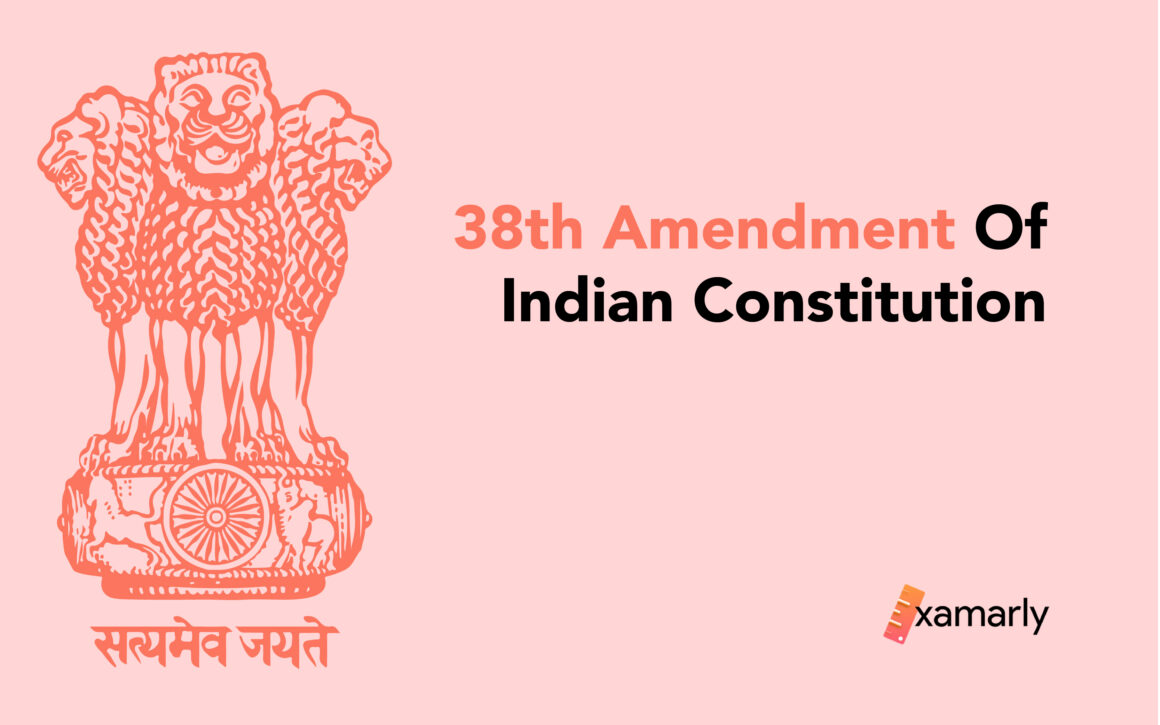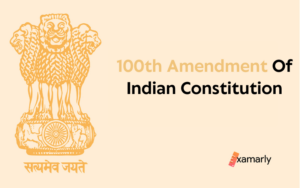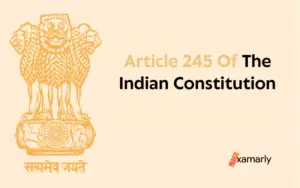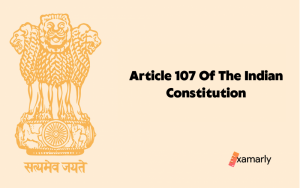The 38th amendment of Indian constitution is a significant piece of Indian law. The amendment codified the declaration of Emergency and codified the State’s power to remove fundamental rights at the time of emergency. Amendment of Article 123, 213, 239B, 352, 356, 359, and 360 of the Constitution took place in this 38th Amendment. The bill for the 38th Amendment was introduced by H. R. Gokhale. Its aims and provisions have shaped the way we live in India today.
The Constitution Thirty-eighth Amendment Act 1975
The Constitution Thirty-eighth Amendment Act 1975 made a number of changes to the Indian Constitution. The prominent changes are:
- This Amendment made the declaration made by the President of India, of the emergency non-justiciable.
- The 38th Amendment of Indian constitution increased the State’s authority to suspend people’s fundamental rights when a state of emergency is in effect, it can be issued on different grounds, being war or external aggression, or internal disturbance.
- Additionally, it barred judges from reviewing any of the president’s or governor’s multiple declarations of emergencies.
- The judicial scrutiny of emergency declarations relating to the laws passed during the emergency was likewise prohibited.
When it was first submitted in the Lok Sabha on July 22, 1975, the Constitution (Thirty-eighth Amendment) Act, 1975, was known as the Constitution (Thirty-ninth Amendment) Bill, 1975. The Bill aimed to change the Constitution’s provisions 123, 213, 239B, 352, 356, and 360.
The brief title of the Bill was changed to “The Constitution (Thirty-eighth Revision) Act, 1975” following a formal amendment to clause 1 on July 23, 1975, when it was discussed by the Lok Sabha. On July 24, 1975, the Rajya Sabha took the Bill under consideration and approved it as enacted by the Lok Sabha. Clauses 2 to 8 of the Bill were adopted in the original form by the Lok Sabha and the Rajya Sabha. it got enacted by the Parliament in the Twenty-sixth year of the Republic of India.
Article 123 authorizes the President to issue Ordinances when both Lok Sabha and Rajya Sabha are not in session if he believes that conditions exist that necessitate prompt action.
Article 123 – This article of the Constitution confers corresponding powers to the Governor when the Legislature of a Union territory is not in session. The Administrator is given similar duties under article 239B. There is no question in the plain text of paragraphs 123, 213, and 239B that the satisfaction indicated in those articles is subjective and not justiciable. This was also the objective of the Constitution’s drafters. However, the arguments were being raised that the issue was susceptible to judicial review and that there was litigation regarding the issue’s justiciability To put the subject beyond debate, the Bill sought to include language in the Constitution stating that the satisfaction of the President, Governor, or Administrator is final and conclusive and cannot be challenged in any Court on any grounds.
Article 352 authorizes the President to declare an emergency. And if he believes that war, external aggression, or internal disturbance endangers the security of India or any portion of it, he may declare an emergency on that grounds.
Remark: First sentence is grammatically incorrect and the second sentence is incomplete. If you break any sentence making it two, read it first to ensure that both are complete on their own.
A similar remark goes with the below blue highlighted sentences.
Article 356, authorizes the President to assume the functions of a state’s government if the constitutional machinery in that state fails and the state’s government cannot operate.Similarly, Article 360 gives the power to the President to declare a financial emergency if he believes that India’s financial stability is jeopardized. Again, the problem of satisfaction appears to be nonjusticiable on the face of the articles. However, the legitimacy of the Proclamation issued under Article 352 had been disputed in various processes, wasting public time and money, the Bill sought to change these three above-said provisions to make the President’s satisfaction definitive and conclusive, and not justiciable on any grounds. (which 3 provisions?)
Concerning article 352, certain writ petitions argued that while the first Emergency Proclamation was in effect, no additional Proclamation of National Emergency may be issued. To put the situation beyond debate, the Bill stated in article 352 that the President may issue different Proclamations on different grounds regardless of whether or not a Proclamation is already in existence and in force.
When a Proclamations of Emergency is in effect, the President has the authority under Article 359 of the Constitution to issue an order suspending the right to petition any Court for the execution of any of the rights given by Part III that are stated in such order. The powers granted by this article were meant to be employed during an emergency in accordance with the necessities of the circumstance.
However, while the Proclamation of Emergency is in effect, Article 358 makes the terms of Article 19 automatically inapplicable, and its provisions have no bearing on the authority to enact any laws or exercise any executive authority.
The purpose of the fundamental principle of article 359 appears to be that when an order is made under clause (1) of the article with respect to any of the rights granted by Part III and stated in the order, the order has the same impact on those rights that article 358 does on article 19. The Bill intended to modify the Constitution so that there would be no linguistic inconsistencies between article 358 and the text of the Presidential Order under clause (1) of article 359.
In order to achieve the aforementioned objectives, the Bill proposed amending articles 123, 213, 239B, 352, 356, 359, and 360 of the Constitution.
See Also – 37th Amendment Of Indian Constitution
Provisions In 38th Amendment Of Indian Constitution
The constitution provides that the President has the power to promulgate Ordinances in a situation where the legislature is not in session. The Governor has similar powers. Articles 213 and 239B also confer these powers on the Administrator. These provisions are not justiciable in nature.
Article 352 of the Constitution of India, has been amended by adding two clauses that say the president has the power to declare an emergency to issue a different proclamation on different grounds, such as war or external aggression, or internal disturbance.
Amendment of Article 356 of the constitution has been amended by inserting a new clause. By this insertion, the satisfaction of the president mentioned in clause (1) shall be final and conclusive and shall not be questioned in any court on any ground.
Amendment of article 359 of the constitution by inserting therein a new clause. it states that while an order issued by the President under clause (1) suspends enforcement of any of the rights conferred by Part III of the Constitution during emergencies, nothing in that Part shall limit the State’s power to make any law or take any executive action that the State would be competent to make or take but for the provisions contained in Part III. It also states that any legislation thus enacted must, to the degree of incompetence, cease to have force as soon as the Presidential order ceases to function, save in respect of actions done or omitted to be done before the law so ceases to have an effect.
Amendment of article 360, The article has been updated with a new clause. By virtue of this provision, the satisfaction of the President expressed in clause (1) regarding the proclamation of Financial Emergency is final and conclusive and is not justiciable in any Court for any reason.
Related – 38th Amendment in Constitution of India | 38 Constitutional Amendment
Ratification
The 38th Amendment of Indian constitution declares that any proclamation issued by the President under a state of emergency is neither justiciable nor debatable. Under this provision, the President has the authority to revoke people’s basic rights based on the circumstances surrounding the declaration of an emergency.
The 38th Amendment of Article was only ratified by more than half of the state legislatures. The Act was proposed on July 22, 1975, and received Presidential approval 10 days later. Jammu & Kashmir, Gujarat, Manipur, Nagaland, and Tamil Nadu were among the states that did not ratify it.
Conclusion
Officially, the constitution (Thirty-Eighth Amendment) Act,1975 made the Emergency final and inclusive. And also it gave the power to State to remove fundamental rights from its citizens during a state of emergency. Ongoing amendment procedure to eliminate obsolete and unproductive portions and integrate new ones in response to evolving social requirements. As a result, changes are required, but they should improve people’s living conditions and foster social peace rather than demolish the current framework.






